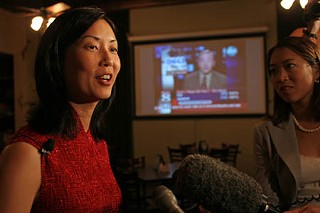Place 3: Shade's Surprising Landslide
Even after winning, Shade takes jabs at Kim
By Richard Whittaker, Fri., May 16, 2008

Twenty-seven percent.
That was what got Jennifer Kim onto council in 2005 and, in a shocking blowout, what got her out in 2008. In 2005, 27% was enough to get her into a run-off against Margot Clarke, which she then won. But this time it signified a rout, as challenger Randi Shade romped home with a decisive 64% victory.
It seemed no one saw it coming. At the Shade election-night party at the Galaxy Cafe, rumors were of a low turnout, something which normally benefits an incumbent. So there was shock and elation when the early-voting results came in, giving Shade 62% and a 34-point lead. "I'm surprised it's such a big margin," said Shade as she heard the first news. "I was expecting things to be much closer." Campaign consultant Mark Nathan heard the early vote numbers and declared, "It's just a question of how much we win by, ultimately."
Until Saturday night, there was no definitive sign that Shade was even going to manage a squeaker win, with handicappers talking about every possibility, including Ken Weiss' third-place candidacy forcing a run-off. (Only days earlier, one campaign insider said if that happened, "The most reviled politician in Austin won't be Jennifer Kim or Randi Shade; it will be Ken Weiss.") But as the first few voting day precincts came in, it was immediately clear that no last-minute switch could save Kim. Shade built on the early advantage, in fact, pushing her final total up to 64%. That increase came at the cost of both Kim and Weiss, who scraped in at 9%.
In another coup for Shade, Place 3 earned the biggest turnout of any race, with 34,590 votes cast. (Alas, that's no cause for celebrations of democracy: When Place 3 was last up for grabs in 2005, 59,265 voted in the May ballot. Even June's Kim/Clarke run-off mustered 36,483). Shade put her victory down to the breadth of her coalition and how much it built upon personal friendships going back to her days helping launch AmeriCorps in Texas in 1993. "The reason I was able to do so well in the beginning was the friends from all those groups," she said, and this translated into a network of block walkers, phone-bank workers, and fundraisers.
As for any incumbent, the conventional wisdom was that the race was Kim's to lose: Even Shade called the vote "two-thirds a referendum" on Kim and said Kim's negative campaigning had backfired. "You don't usually see an incumbent go negative, and I really think that her campaign's attacks were fictitious characterizations and false accusations," said Shade. As for her own attacks on Kim, she called them fair. "The challenges she's had getting along with other people, those are real."
Kim called Shade well before the final votes were tallied to congratulate her, and stood by her own record. "I've been the most independent member of the council, and I don't regret a thing," she said. As for her reputation as a contrarian, she said, "I don't see that as a bad thing. I'm not someone who's just going to go along to get along," pointing to her opposition to tolling existing roads and development in the Balcones Canyonlands Preserve and her continued support from environmental groups.
Moreover, the Kim campaign argued that the negativity began months before Shade even declared and that it was directed at Kim. The turning point, according to Kim campaign manager Elliott McFadden, was "Gategate," the infamous incident in January 2007, when the story broke that Kim had requested privileged access to Austin-Bergstrom International Airport to avoid the lines at security checks. A still-unknown source leaked a report from the city manager's office about the request to the Austin-American Statesman. (Shade would pounce on the incident in her campaign TV spot with the line, "Unlike my opponent, I'll be happy to stand in line with you at the airport any time.") Kim's loss, McFadden argued, came after more than a year of media pile-on, in which she became the scapegoat for several unpopular measures, like the proposed panhandling ordinance, or on divided votes in which she was not the only council member involved. "The stories were a little more sensational and a little bit easier for people to get their heads around," he said.
As for Shade's next step? She still wants to broaden her coalition. "I really want to reach out to those people who supported Jennifer and to build the best team I can," she said. After that, she will turn her attention to the budget and start looking at priorities and trade-offs: "Not the nice-to-haves but the need-to-haves."
Got something to say on the subject? Send a letter to the editor.











